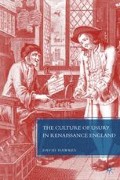Abstract
The process by which people ceased to “believe in” magic was remarkably swift for such a seismic shift in consciousness; it took place over the course of the seventeenth century. A person born in 1600, when almost all educated people “believed in” magic could easily have lived long enough to witness a world in which virtually none of them did. This epochal change distinguishes the modern Western consciousness from the vast majority of its forebears, and also from many of its contemporaries, as we learn from the recent resurgence of witch-panics throughout the postcolonial world. A change of these dimensions could not have occurred with such rapidity had not English minds been prepared by a course of ideological indoctrination, and the process by which usury attained respectability was an important part of that curriculum. I have been arguing that, at least at the beginning of our period the economic, liturgical, and magical modes of autonomous representation were not fully distinguished from each other. Indeed, sixteenth-century literature often explicitly connects them, and it frequently does so on what might seem the surprising grounds that they are all forms of alienated labor. In John Bale’s didactic propaganda play Comedy Concernynge Thre Lawes (1538) we hear that the character named Idololatria can perform labor by means of both pagan and Papist magic.
Access this chapter
Tax calculation will be finalised at checkout
Purchases are for personal use only
Preview
Unable to display preview. Download preview PDF.
Notes
John Bale, Comedy Concernynge Thre Lawes (Tudor Facsimile Series, 1908).
Fredson Bowers (ed.), The Dramatic Works in the Beaumont and Fletcher Canon. Vol. 10 (Cambridge UP, 1996).
See David Hawkes, The Faust Myth: Religion and the Rise of Representation (Palgrave: New York, 2007).
Christopher Marlowe, Doctor Faustus and Other Plays. David Bevington and Eric Rasmussen (eds.) (Oxford UP, 1995), 1.3.45. Subsequent references will be to this edition.
For accounts of Aquinas on the per se and the per accidens, see Jan Aertsen, Nature and Creature: Thomas Aquinas’s Way of Thought (New York, E.J. Brill, 1988), 58–67
and Robert Pasnau, Thomas Aquinas on Human Nature: A Philosophical Study of Summa Theologiae 1a 75–89, (Cambridge UP, 2002), 270–78.
Dante Alighieri, The Divine Comedy (Everyman: New York, 1995), 59.
See Georg Simmel, The Philosophy of Money. Trans. Tom Bottomore and David Frisby (Routledge: New York, 2004), especially 79–81.
William Shakespeare, The Tempest (1.2.345) in The Complete Works, Alfred Harbage (ed.) (Penguin Books: New York, 1969). Subsequent references will be to this edition.
See Philip Whaley Harsh, “The Intriguing Slave in Greek Comedy,” Transactions and Proceedings of the American Philological Association 86 (1955): 135–42.
Plautus, Amphitruo, ed. Henry Thomas Riley (1912) The Comedies of Plautus. 2 vols. London: G. Bell and Sons. 2:1–62.
William R. Dynes, “The Trickster-figure in Jacobean City Comedy,” Studies in English Literature 1500–1900 33.2 (Spring 1993): 365–84.
Michael Zink’s The Invention of Literary Subjectivity (Johns Hopkins UP, 1999) offers a compelling account of this process as it took place in France.
George Puttenham, The arte of English Poesie (BiblioBazaar, 2009), 174.
See David Hawkes, “Commodification and Subjectivity in John Bunyan’s Fiction,” The Eighteenth Century: Theory and Interpretation 41.1 (Spring 2000): 37–55.
Theodor B. Leinwand, The City Staged: Jacobean Comedy 1603–1613 (Madison: U of Wisconsin P, 1986), 79.
Lloyd Kermode, “Introduction” to Three Usury Plays (Manchester: Manchester UP, 2009).
Cit. Lloyd Edward Kermode, “Introduction” to Three Usury Plays (Manchester: Manchester UP, 2009), 21.
Percy Bysshe Shelley, “Ode to a Skylark” in Complete Poems (London: Modern Library, 1994).
Copyright information
© 2010 David Hawkes
About this chapter
Cite this chapter
Hawkes, D. (2010). Magic, Labor, and Allegory: Imagining the Usurer. In: The Culture of Usury in Renaissance England. Palgrave Macmillan, New York. https://doi.org/10.1057/9780230107663_6
Download citation
DOI: https://doi.org/10.1057/9780230107663_6
Publisher Name: Palgrave Macmillan, New York
Print ISBN: 978-1-349-37978-1
Online ISBN: 978-0-230-10766-3
eBook Packages: Palgrave Literature CollectionLiterature, Cultural and Media Studies (R0)

